Geopolitics
The Georgian Parliament approves the 'Foreign Agents Law'

On May 14, the Georgian Parliament adopted an extremely controversial law tightening controls and increasing penalties for entities obtaining more than 20 percent of their annual income from abroad. Georgian President Salome Zourabishvili, a leading advocate of European integration, has vowed to veto the controversial legislation when it reaches her desk. However, she emphasizes that the ruling Georgian Dream party can override the veto by collecting 76 votes.
Protests have been going on in Tbilisi for several weeks in connection with the government’s attempt to adopt a law on the so-called „foreign agents”. According to the project, legal entities and media organizations that obtain more than 20 percent of their annual income from abroad will be officially recognized as entities acting on behalf of foreign authorities. Additionally, in accordance with the new guidelines, they will also be monitored by the Ministry of Justice and thus may be forced to disclose confidential information under the threat of severe financial penalties of up to GEL 25,000 (approximately USD 9,400/PLN 37,000).
The new proposal appears to be a reference to a similar act adopted by Moscow in 2012, when authorities used new laws to crack down on their political opponents, from independent media institutions to human rights organizations. Critics therefore emphasize the possibility of the same situation occurring in Georgia. Many claim that the Georgian government is using this law to bring their country closer to Russia. At the same time, it is suppressing citizens« objections before the key parliamentary elections that will be held this fall. However, supporters of the project emphasize the need to ensure greater transparency of information on foreign financing. They reject the accusation that the act is based on Russian legislation, recalling that the US Foreign Agents Registration Act (FARA) of 1938 operates on similar principles. It should be emphasized, however, that the provisions of FARA cover much fewer entities than the Georgian law, and the accusation is based on the direct representation of the interests of a third country, and not only on foreign financing (which may include, for example, running a project under received grants or EU subsidies).
Although the Georgian government assures that the law only aims to increase the transparency of public life and is not directed against any party, it is difficult to believe that the newly adopted law will have a positive impact on the level of democracy in the country. All similar initiatives previously introduced in the post-Soviet space - whether in Russia or Kyrgyzstan - had a harmful impact on all rights and freedoms there. Taking into account the historical context and the specific model of bilateral relations between Tbilisi and Moscow, it should not be expected that Georgia will be an exception here.
Second approach to the act
It is worth mentioning that the Georgian Dream party tried to adopt the above-mentioned law in the spring of 2023, but ultimately withdrew it due to mass riots. However, the current development of the situation shows that it has not abandoned its plans. Taking into account the
changes taking place in Georgia’s internal and foreign situation, the government again tried to push through the controversial law.
At this point, attention should be paid to two main impulses for the quick approval of the new regulation. First of all, it is worth mentioning the return to the local political scene in early 2024 of the founder of the ruling party, Bidzin Ivanishvili, who openly supported the project. In his opinion, the new law will help protect the state’s sovereignty and prevent Tbilisi from being drawn into a conflict with Moscow. An additional, but equally important, issue is that Georgia has finally obtained the status of a candidate country for joining the European Union. It would seem that the Georgian Dream saw this step as a balancing factor for society’s future disappointment. However, the ratio of satisfaction with the accession process to the level of disappointment with the new law turned out to be unequal, which led to numerous clashes between demonstrators and law enforcement services.
Last weekend, over 50,000 protesters gathered in Tbilisi to demand the rejection of the new law. Thousands of people also spent the night outside the Georgian Parliament, with some even trying to prevent lawmakers from entering the building. In the early morning hours, masked services dispersed the crowd using water cannons, tear gas and rubber bullets. Russian state media reported that among the 20 people detained were two Americans and one Russian.
Representatives of opposition parties, non-governmental organizations, as well as ordinary citizens who oppose the new legal changes declare their readiness to continue the protests despite a number of repressions introduced against them by the pro-Russian government. It is worth recalling here that Moscow is responsible for Tbilisi’s loss of control over approximately 20% of its state’s territory. This resulted primarily in the fact that over 80% of Georgian society supports full integration with the European Union, and its young generation, brought up in the light of Western ideas and values, sees no possibility of strengthening relations with Russia.
The European Union’s reaction
Brussels, which granted Georgia the status of an EU candidate country in December last year, clearly warned Tbilisi against adopting the above-mentioned law, which will most likely be used to silence independent voices in the country.
The High Representative of the Union for Foreign Affairs and Security Policy Josep Borrell and the European Commissioner for Enlargement Oliver Varhelyi issued a joint statement in which they described the current developments in Georgia as „worrying”.
„The final adoption of this law will have a negative impact on Georgia’s progress towards the EU. This law is inconsistent with fundamental EU norms and values.”
However, it seems that Georgian Dream still holds out hope as Brussels is currently too busy with other matters to address the Tbilisi issue. It is also unlikely that the EU will quickly change its decision on Georgia’s candidacy. The complete exclusion of this country will automatically push it into the arms of Russia, of which the West is well aware. The June results of the European Parliament elections will also be important in this context. At the moment, the Georgian government does not have strong allies, which is the result of, among others, last year’s homophobic statements by the Georgian Prime Minister.
The future of Georgia
In polls from December last year, Georgian Dream was ahead of its closest rivals by about 21 percent, which shows that the party has so far enjoyed moderate public support. The current government could boast of several significant successes in conducting foreign policy. During its last term, Georgia both gained EU candidate status and improved bilateral relations with the Russian Federation, which officially recognized it as a „non-hostile” country. In addition, the war in Ukraine also affected the economic situation in the region. The Georgian economy is currently experiencing a revival thanks to the increase in the number of (usually wealthy) migrants from Russia who, for various reasons, have decided to leave their country temporarily or permanently.
Taking the above into account, it may seem that the currently ruling party was so self-confident that it did not even try to look for a possible consensus that would at least slightly satisfy the (divided) opposition. Thus, feeling that it could neither gain nor lose, it adopted a controversial law thanks to which it acquired a new weapon to fight political opponents. At the same time, it declared its constant willingness to cooperate with Western countries, both bilaterally and multilaterally. It can be believed that such approach is strengthened by the fact that the European Union, taking into account the changes currently taking place in its immediate environment, cannot afford to downplay the problem, much less completely exclude a candidate country balancing between the East and the West.
